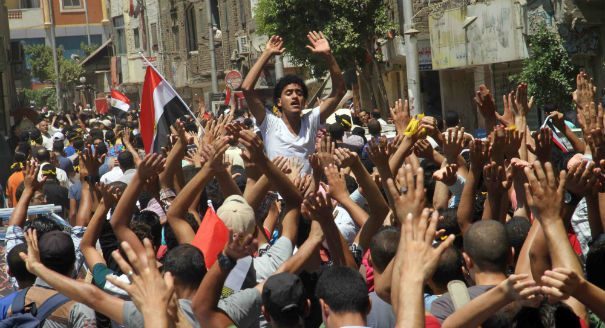The Muslim Brotherhood, following a long process of internal reflection and debate, has chosen confrontation as its preferred tactic to challenge the regime of Abdel Fattah el-Sisi. After nearly two years of pursuing nonviolent resistance to secure its long term interests, the group is entering into a game of tug-of-war with Egyptian authorities.
On June 1, authorities arrested Mahmoud Ghozlan, a former Muslim Brotherhood spokesman and one of the organization’s hawks, whose open letter titled “Our call remains and our revolution continues” appeared on May 22—following nearly twenty months’ absence—which ruled out violence and stressed the need for peaceful resistance. Brotherhood media spokesman Mohamed Montasser described the arrest as a “failed attempt … to set back the revolutionary heroes across the country.” Prior to the arrest, Brotherhood youth—who are now driving the group toward a more hardline approach—had rejected Ghozlan’s overtures as a prelude to reconciliation with the Sisi government.
On May 27, 159 Islamic preachers and scholars from 35 different countries issued a statement titled “Egypt Call” at odds with Ghozlan’s appeal. Their statement condemned the Egyptian regime and said that resisting authorities was a “legitimate duty” of the umma (Islamic nation). The document maintained that resisting the Egyptian regime was a duty for all Muslims regardless of nationality. “Egypt Call” also stressed that Mohamed Morsi is the country’s legitimate president and sharply criticized the grand Imam of Al-Azhar and various other parties. The Muslim Brotherhood, in another statement released the following day, welcomed and endorsed this message. In addition, former spokesperson of the Muslim Brotherhood Ahmed Rami said that the statement has committed youth to a “long game” against the regime.1 But Rami also stressed that the group is differentiating between legitimate resistance and general criminality, which it plans to avoid.
The next indicator of the Muslim Brotherhood’s tactical shift came one day later on May 28, when Brotherhood member Mahmoud Hussein, a former secretary-general of the Brotherhood, issued a statement on his Facebook page in which he referred to himself as the group’s secretary-general. At the same time, news reports emerged describing a “coup” within the group. The intensifying internal tension was reflected in Media spokesman Mohamed Montasser emphasizing on Ikhwan Online and Al Jazeera’s “Hashtag” program that the Brotherhood had a new deputy secretary-general—not Mahmoud Hussein. Hashtags such as #We_Will_Not_Go_Back began to appear across social media platforms, referring to the refusal of Brotherhood youth to return to former leadership.
Underpinning the shift has been a series of structural changes. The Brotherhood has been forced to become more discreet with its Islamic education program, and its usra (family) meetings across Egypt have met in smaller groups to avoid crackdowns from Egyptian authorities. In addition, there have been a number of changes to the Muslim Brotherhood’s internal working committees—which carry out the group’s daily administrative duties. The first of these changes came through the Charity Committee, which provides monthly aid and subsidies to the poor and needy, both among the general public and within the Brotherhood itself. Renamed the “Committee for the Affected,” this new body will only support Brotherhood families whose breadwinners had died, been arrested, or expelled from Egypt. Other than ensuring a basic social safety net, it will allow these members to withstand the envisioned long-term battle against the regime and provide them with more breathing room to focus on these efforts without fearing for their families’ economic livelihood. Perhaps recognizing the danger to the regime this poses, On June 1 security forces arrested two members of the committee for holding a gathering in Alexandria’s Hadara district.
In addition, the Committee to Propagate Missionary Work was renamed the “Awareness Committee.” In the past it had focused on missionary work (dawa), visiting neighborhoods and cities, and organizing religious events to disseminate moral or devotional concepts. But the new committee now seeks to generate more opposition to the Sisi regime by communicating directly with the public to explain the Brotherhood’s vision and other mobilization efforts, and each international branch of the group now has a similar committee. Other committees have also been established, such as the Crises and Mobilization Committee, which is responsible for coordinating demonstrations, and the Sisters Committee, which oversees women’s efforts to support the group. At the same time, some committees were either disbanded, like the Preparatory School and High School Committees, or folded under the control of other committees such as the University Committee, which was made part of the Youth Committee though it had previously enjoyed relative independence. These shifts indicate the Brotherhood’s changing priorities away from education and missionary work toward mobilization against the Sisi regime.
While most agree on the push for more confrontation, what that entails remains to be seen, and there are currently two competing schools of thought within the Brotherhood. The first is the idea of a full-blown revolution, where youth will rely on the declining popularity of the Sisi regime and mobilize young people from both inside and outside the Muslim Brotherhood. The second, however, would entail orchestrating a military coup supported by both Islamists and disaffected officers. Some within the Brotherhood leadership favor this approach, including Midhat al-Haddad, one of the group leaders now based in Turkey. On January 29, for example, he said in an interview on the Mekameleen TV channel that there are significant rifts within the Egyptian army and that discontent is rising. In either case, instability looms on the horizon whatever happens in the coming months.
Abdelrahman Youssef is an independent journalist focusing on religious movements and political affairs.
This article was translated from Arabic.
1. Interview with the author.






